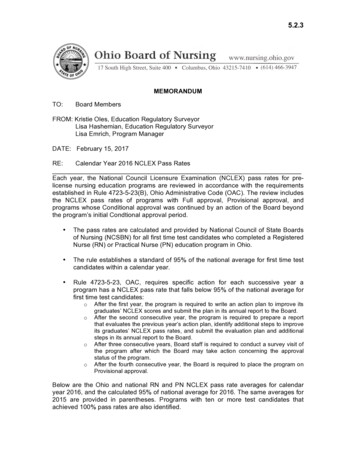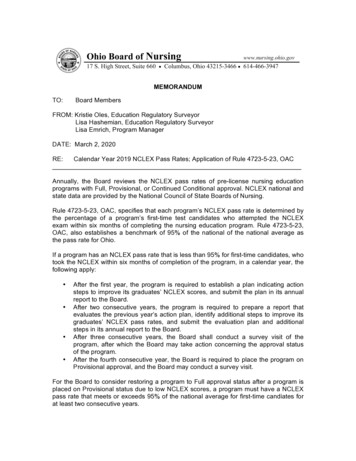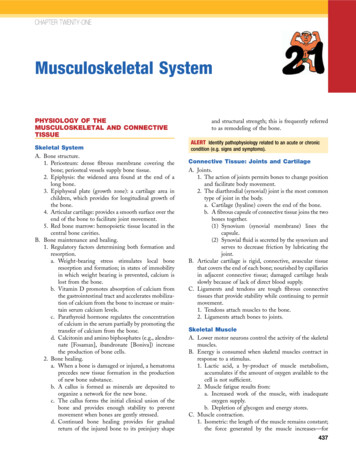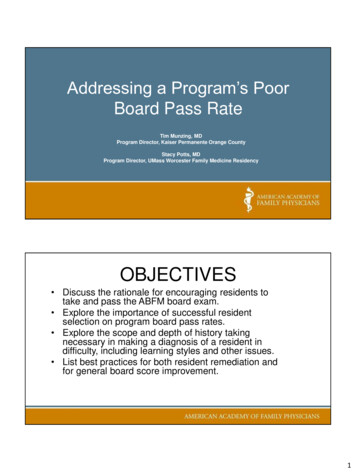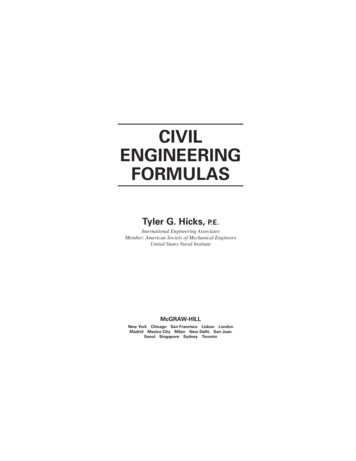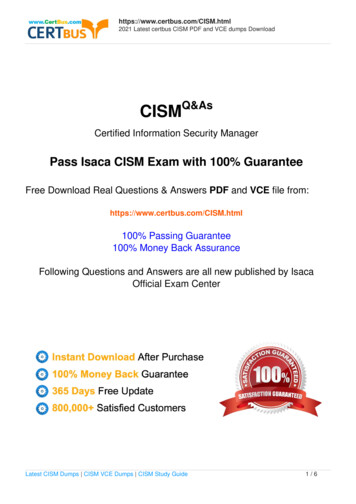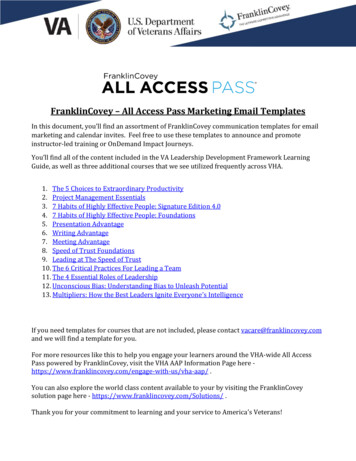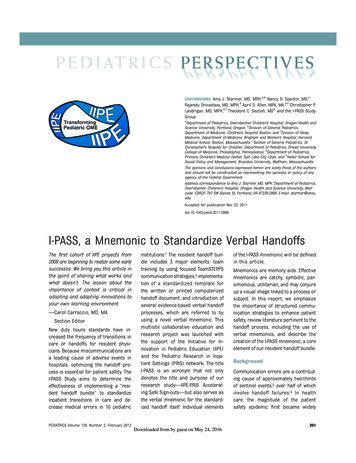
Transcription
HOW TO PASSTHE NCLEX Kendall Wyatt, RN (Picmonic Instructional Content Strategist)Marlee Liberman (Picmonic Nursing Content Scholar)For more information,head to www.picmonic.comPICMONIC.COM
TABLE OF CONTENTSIntroduction . Page 3Meet Our Nursing Pros . Page 4Part 1: Preparation . Page 5Understand How the NCLEX Works . Page 6Set a Goal . Page 8Know Your Strengths and Weaknesses . Page 9Allocate Time. Page 9Get Prepared . Page 10Part 2: Master the Questions . Page 11Condition Yourself to Answer Questions . Page 11Hail Mary! Okay. You’ve Read the Question andYou Have No Idea. . Page 13Practice It All with Questions . Page 14Picmonic Question of the Day . Page 14Conclusion . Page 15PICMONIC.COM2
INTRODUCTIONWe’ve developed this free Study Plan to help youtackle your nursing school exit exams like ATI, HESI,and most importantly, the NCLEX .At Picmonic, we’re masters of memorizing. By using our product along with thisplan, you’ll be on your way to test success! Keep in mind there’s no shortcut forhard work but we’ve included lots of “Pro Tips” and advice to help you along theway.Do you have to stick with the suggestions mentioned? Absolutely not. Use thisadvice to fit your needs and learn from those that have been there before. Thisplan has been broken down into two sections: Preparation and Master theQuestions. In Part 1 we will discuss some strategies on how to best prepare forthe NCLEX . Part 2 will build off the strategies introduced in Part 1 and will helpyou when it’s time to perform.PICMONIC.COM3
MEET OUR NURSING PROSKendall Wyatt, RNPicmonic Instructional Content StrategistKendall is no stranger to the world of standardized testing. Ashe currently holds dozens of certifications, he has run throughthe gamut of late night studying, stressful cramming and ofcourse, those grueling testing days a multitude of times.Drawing on his expertise as a licensed EMT, RN and havingsuccessfully passed his medicine boards, Kendall has beeninstrumental in helping both nursing and medicine studentsthrive with his contributions to the Picmonic Learning System.He currently resides in sunny Phoenix, Arizona where he worksalongside renowned author JoAnn Zerwekh EdD, RN, and thePicmonic Team on a variety of projects that have benefittednursing students across the U.S.Marlee LibermanPicmonic Nursing Content ScholarAs a recent nursing grad, Marlee understands the struggles thatnursing school throws at you - not to mention the overwhelmingpressure preparing for the NCLEX ! Marlee brings a unique skillset to Picmonic, with her previous degree in broadcastjournalism. Her blend of talents provides her with the knack forsimplifying complicated concepts and demystifying the world ofnursing.Marlee splits her time between the Arizona desert and theCanadian Rockies, and she hosts Picmonic’s awesomeYouTube channel and webinars alongside Kendall.PICMONIC.COM4
PART 1 - PREPARATIONImagine walking out of the NCLEX testing center wondering what question 76would have been. 75 questions and the test shut off. Before you know it, you’reout of the center and walking to your car with your head held high. You justaccomplished the final milestone, and you don’t know who to call first or howyou’re going to celebrate. You just know that not long from now you will be off toyour new career as a registered nurse!You’ve come so far to get here.Now imagine another scenario: you weren’t counting, but the questions just kept comingand coming. You may have noticed others leaving the testing center long before you did.You weren’t sure if you were facing that dreaded “Select All That Apply” question morethan you actually were. Suddenly, that all too familiar feeling of doubt hits. You begin toask yourself if you studied the right material, or worse, if you studied enough. You startkicking yourself for not making more time to study.You begin to wonder, “What’s going to happen next.retest?”Obviously, we want to roll with scenario one and if you’re reading this, then there is stilltime to prevent scenario two. (Or, if you’ve already lived through scenario two, to makesure it doesn’t happen again.)Let’s go back to scenario one. Visualize test day. Visualize and really capture the essenceof that victory. Go wild! Close your eyes and imagine the relief you’ll feel when all is saidand done. Are you ready and willing to work as hard as you need in order to make thathappen? Now is the time to be honest with yourself.If you are willing to put in the work, then let’s press forward! As we do so, hold onto thatvision you created. Test day will be here before you know it, and understand that withhard work and due diligence, that vision will become reality.PICMONIC.COM5
UNDERSTAND HOW THE NCLEX WORKSYour mission: pass the NCLEX the first time (so you can see the letters “RN” behind yourname). It’s a daunting task for sure, but we’re here to give you the edge you need for yourbig day by addressing some common questions about the exam itself (also, check out theNCSBN web page on The Night Before the Exam).1. How many questions will I get?2. When will my exam end?3. How long do I have for the exam and what about breaks?4. What types of questions should I expect to see?1Q: How many questions will I get?A: 75 - 265We want you to pass with 75 questions, but make sure you aren’t going to have an anxietyattack at question 76. Remember the ultimate goal: passing.To pass with 75 questions, you will need to answer more difficult and complex questionscorrectly like “Select All That Apply” (SATA). Trust us, we hate those too! The key here is tobe a master of the content! Picmonic is great at helping you remember all of the grittydetails.Don’t freak out on question number 76, or even 77. It’s not over! Take a break and gatheryour head. Sit back in your chair, and close your eyes for a moment. See yourself as anurse, and once you’ve taken a few deep breaths, get back at it. This just means the examwill ask you some less difficult or less complex questions to make sure you have the“minimum level of knowledge.”In 2012, the average number of items (questions) administered per candidate was around119 on the NCLEX -RN and 117 on the NCLEX -PN.Reference: NCSBNPICMONIC.COM6
2Q: When will my exam end?A: The exam will end at one of three scenarios:1. When the adaptive testing determines you are at a sufficientlevel to pass the exam in each subject area (using a 95%confidence rule)2. When a maximum of 5 hours of testing is reached3. When a maximum of 265 questions have been answeredYou’ll need to be at a passing level in EACH subject area. Have you had an instructor saythat the NCLEX will find your weaknesses? Well it’s true!Don’t forget to review other subject areas like psychology and obstetrics. If you’re weak inOB/GYN, then you’re less likely to get the SATA questions correct.Do not rush! We repeat: DO NOT RUSH! Don’t be worried about running out of time. Feelfree to read a question twice. Spending another few seconds to get a question correctrather than guessing and feeling pressured for time will likely end in better results.Did we mention don’t rush? If you run out of time, the system will analyze the last 60questions you answered to help determine whether you pass or fail. Put your best footforward on each question.Don’t sweat it. If you don’t know a question, make your best guess and move on.Reference: NCSBN3Q: How long do I have for the exam, andwhat about breaks?A: Total length: Up to 5 HoursPer the NCSBN website, you will be given a scheduled break after approximately twohours, followed by another one after three and a half hours have passed by.To maintain a level head during the exam you should take the breaks! Remember, breakstake away from your total test time, so don’t spend all day relaxing.PICMONIC.COM7
4Q: What types of questions should I expectto see?A:1. Multiple Choice (ONLY 4 choices 1,2,3,4)2. Place the sequence in order3. Select All That Apply (SATA)4. Fill in the blank (usually math)5. Drag and drop charts6. Hotspot (place the cursor over the area on the diagram thatdoes the selected action)7. Chart/Exhibit8. Graphic Option9. AudioThere are several different question format types that you should expect to see on examday, so make sure you thoroughly read the question before answering. Don’t get fooled!We recommend practicing with a question bank before your exam in order to get morecomfortable with the question formats.SET A GOALPick a week to take your exam- and stick to it! After you pick your date, work backwards tocreate your personalized study plan.Our study plan is designed to help you master the content and reinforce it with a questionbank of your choosing. We’ve estimated this should take you between 4 and 6 weeksbased on how many hours per day you put in and your knowledge level. The time isbudgeted accordingly based on feedback from students like yourself who have been there.Can you go through it quicker? That’s all on you. Need to miss a day? Life happens. Adjustand adapt as needed. You can find it under our Resources section at www.picmonic.comor simply request a copy by sending an email to feedback@picmonic.com.Whether you utilize our study plan or another resource, stick with it!PRO TIPDon’t procrastinate on taking your exam. Students who wait a long time totake board exams after graduating school often do worse. The informationdoesn’t stay fresh in your brain. You’ve come so far, just get it done!PICMONIC.COM8
KNOW YOUR STRENGTHS AND WEAKNESSESYou’ve completed or are about to complete nursing school, and it’s possible you have afew weaknesses. Gather your exit exam score sheets, take a look at your exam scores oreven your course grades. If you know your weak areas before you start studying, you’ll bebetter able to make sure those don’t trip you up on exam day.PRO TIPDon’t skip high yield content and hope you don’t get questions about it.You probably will, and we want you to stay calm. Besides, there’s probablya Picmonic for that.ALLOCATE TIMEYour daily study time can vary greatly. Our Study Plan is designed to cover nearly all areasof nursing, but you may find yourself already a master of certain topics. If this is the case,simply skip ahead, but use gained time wisely.Our study sessions last anywhere from 30 minutes to just over 3 hours. It’s all aboutversatility here. Can you stack days on top of each other? Absolutely. Should you? Well,that’s on you. If the content is too much or you feel burnt out, maybe it’s time to take abreak or call it a day. The main idea is knowing what to expect time commitment wise andplan ahead. This way, you’re not cramming until 3am the night prior. As with any deadline,the sooner you begin, the easier time you’ll have.Get sleep.Depriving your body of neededsleep and recovery time is detrimental to any kind ofeffective studying.PICMONIC.COM9
GET PREPAREDYou’ll be amazed how much more productive you can be with organization. Ever heard thesaying: “a messy bed means a messy head”? It's amazing how little things add up. Thefollowing are just a few suggestions to help ensure that the ball isn’t dropped come testtime. Make sure you have enough gas in your vehicle or that you have areliable means of transportation. Need your lucky shirt? Can’t take a test without it? Make sure it’s laidout and ready to go so you’re not spending time trying to find it. Have all registration necessities in order like proper forms of ID. Lastthing you want to do is get to the testing center and not be able to test!PRO TIPMake sure you have the right ID on exam day! Click here to read an articleabout what will be accepted and what won’t be.The more you think ahead, the more smoothly things will go for you. Your focus andchallenge for the day is the NCLEX . Nothing else.PICMONIC.COM10
PART 2 - MASTER THE QUESTIONSCONDITION YOURSELF TO ANSWER QUESTIONSAt Picmonic we love pie, and to make an amazing pie you need a great recipe. Learninghow to answer NCLEX questions is no different. If you follow a recipe as you answerquestions you’ll be eating the pie you really want. Success pie. There are several differentstrategies for answering NCLEX style questions, and here’s our recipe for success. Read the question entirely. Read the entire thing! Every bit!You should always read each question. Don’t get into the habit of skippingahead because you could miss out on an important sentence. Ask yourself: Which part of “The Nursing Process” is this questionasking me?Assessment, Analysis/Diagnosis, Planning, Implementation or Evaluation. If youaren’t immediately sure, you can rephrase the question in your own words.PRO TIPDon’t add to the question. NCLEX doesn’t care about “that one time at thehospital I saw a ” Adding personal experiences to questions will often onlyget you into trouble on the NCLEX .Assessment: Make sure you have always gathered all of the assessment databefore doing an intervention. Even if the patient will “eventually” be getting saidtreatment or intervention you must have a complete assessment before movingahead.PRO TIPYou can only skip ahead in the nursing process in a few scenarios. The mainone: If I don’t do something now, this patient will be in immediate danger orface serious health threats. Don’t kill your patients! Example: Your patient iscyanotic and in obvious respiratory distress. Do you continue to assess?Nope. You sit them up, give th
Imagine walking out of the NCLEX testing center wondering what question 76 would have been. 75 questions and the test shut off. Before you know it, you’re out of the center and walking to your car with your head held high. You just accomplished the final milestone, and you don’t know who to call first or how you’re going to celebrate. You just know that not long from now you will be .
